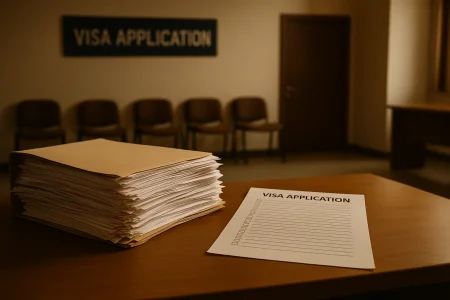
Perfect documentation meets imperfect perceptions at embassy counters worldwide. As travel expert Bethia Idoko explained in a recent interview with Nairametrics, visa denials are often linked to poor documentation. Still, she also noted that "due to Nigeria's reputation in some circles regarding overstays or illegal migration, even well-prepared applications are sometimes scrutinised harshly." In 2024 alone, Nigeria recorded a 45.9% Schengen visa rejection rate, up from 40.8% in 2023, making it the third-highest globally, despite thousands of Nigerians meeting every listed requirement on embassy websites.
This reality exposes the gap between official criteria and unofficial biases that shape visa decisions worldwide.
Nigerian families invest enormous emotional and financial resources in visa applications, often discovering that meeting requirements is just the beginning of a complex psychological evaluation process. Nigerians have spent €27.9 million on Schengen visa applications from 2019 to 2023, with each application costing 22.5% of the national wage in Nigeria. Beyond the financial burden lies the emotional toll of rejection, which can affect family reunions, business opportunities, and educational dreams across the diaspora after months of careful preparation.
Understanding these dynamics helps Nigerian applicants navigate a system where perception management matters as much as documentation quality.
Key Insights:
- Build Strategic Travel History: Start with countries that have relatively more open and easy visa policies for Nigerians to build your travel history, rather than attempting high-rejection-rate destinations first. Countries like South Africa and certain African nations offer more streamlined approval paths, which can strengthen future applications to Europe and North America.
- Address Perception Through Professional Consultation: "Paying for proper consultation can save you from losing more money to rejections," advises travel expert Bethia Idoko. Professional visa consultants understand country-specific biases and can help frame applications to address unspoken concerns about return intentions and financial stability.
- Master the Psychology of "Ties to Home": Successful applications demonstrate compelling reasons to return to Nigeria through property ownership, business investments, family responsibilities, or ongoing employment contracts. This requires strategic documentation that goes beyond bank statements to show deep Nigerian roots and commitments.
- Choose Destinations Strategically: Italy has some of the lowest rejection rates for Nigerians at 32%, while Spain rejected 65.6% of applications. Understanding country-specific approval patterns helps optimise application timing and destination selection for building a positive visa history.
- Protect Against Documentation Fraud: "Completely avoid fake documents; they could get you banned. Too many Nigerians have been blacklisted by the UK and other countries because of fake bank statements or employment letters submitted by street agents." Even unknowing submission of fraudulent documents can result in permanent bans affecting future travel opportunities.
Savvy Nigerian travellers approach visa applications as reputation management exercises, systematically building credibility rather than relying solely on documentation to overcome systemic biases. Success requires patience, strategic thinking, and understanding that each application contributes to changing global perceptions of Nigerian travellers.




